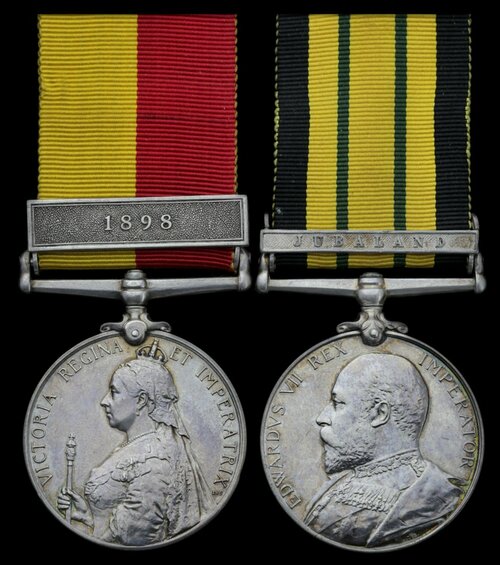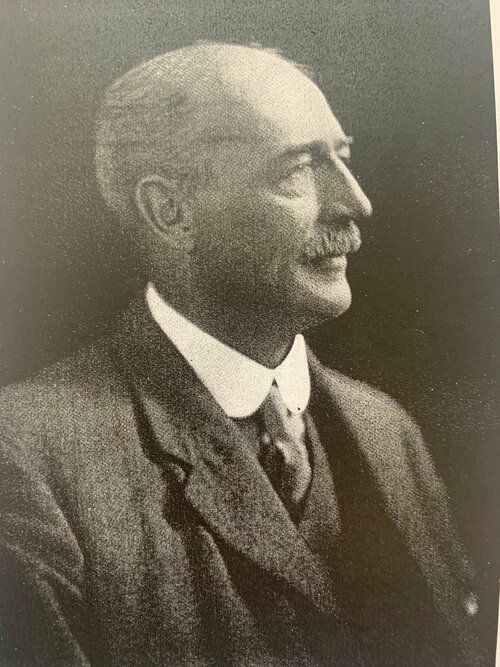Auction: 21003 - Orders, Decorations and Medals
Lot: 299
The East Africa campaign pair awarded to Mr Wallace Blake, Acting Sub-Commissioner of Jubaland, who was later tried for breaking the Official Secrets Act
East and Central Africa 1897-99, 1 clasp, 1898 (Assnt. Collector Wallace Blake.); Africa General Service 1902-56, 1 clasp, Jubaland (Acting Sub-Commissioner of Jubaland, W. Blake.), good very (2)
Frederick Wallace Hastings Blake was born in 1864, son of Major-General George Frederick Blake, Royal Marines and was appointed as an Assistant Collector in the East African Protectorate in January 1898, and arrived at Mombassa from England on 16 March 1898. It was noted that he had previous service in the Cape Mounted Rifles. He took part in the operations against the Ogaden Somalis in 1898 when an expedition under Major W. Quentin, consisting of about 1060 native troops, pacified the country after the troubles there (Medal & clasp).
Following the murder, on 16 November 1900, of Mr Arthur Jenner, Sub-Commissioner of Jubaland, Blake, who then became Acting Sub-Commissioner, was the first to telegraph this news. He was then stationed at Kismayu and signed the telegraph ‘Wallace Blake’. A punitive expedition was formed under the command of Colonel T. P. B. Ternan, and Blake was to have served as Intelligence Officer, having organized an Intelligence Department; he was ‘fully acquainted with local affairs, and will accompany the force in the field’. When Colonel Ternan arrived at Kismayu from Mombassa on 24 November, he found ‘that Mr Blake, the Acting Sub-Commissioner of Jubaland, had strengthened the place by putting up a barbed wire fence and taken various military precautions against a possible attack by the Ogadens.’
In fact Blake did not accompany the expeditionary force but remained at Kismayu as Provost-Marshal (Medal & clasp). In December 1900, Blake fell ill with severe sunstroke and left Mombassa for England in March 1901, by now an Assistant District Officer.
While on six months convalescent leave in London, he met Captain Price, the Governor of Wormwood Scrubs Prison. Captain Price remarked:
'...that East Africa was no place for a man with young children. You're just the right age, you've plenty of experience of training and discipline in the Cape Mounted Rifles and your present job as Magistrate and Administrator makes you very suitable for governing a prison.'
A visit to Major Clayton, Secretary of the Prison Commissioners and Colonel Garcia, one of the Commissioners was sufficient to secure the vacancy as prospective Deputy Governor of Pentonville Prison. He secured an extension of unpaid leave, but very shortly afterwards; he resigned from the Foreign Office and reported for instruction at Chelmsford on 1 February 1902.
During the Great War he was appointed a temporary Major in July 1915, and served as a Commandant, 2nd Class, in the Military Detention Barracks and Prisons. Following a short period of instruction at Aldershot, he was appointed to Chelmsford Prison, which was being used as a Detention Centre. The terms of his appointment were that he would receive the same rate of pay that he would have received in the Prison Service, (sic) £550 per annum and quarters.
In addition to the normal duties as camp Commandant, Blake used the facility as an Intensive training School and personally supervised instruction in: trench digging; bombing and the use of the Lewis Gun and bayonet exercises. This is mentioned because later there was a disputed claim for a war Gratuity on the grounds that his job as a Detention Camp Commandant was substantially different to that of a Prison Governor.
He remained at Chelmsford until 31 January 1919, when the Barracks were closed and he returned to civil employment as Acting Governor of Wandsworth Prison. This was to prove to be a turbulent and controversial appointment as Conscious Objectors were still being detained, and they were most unhappy about the situation. A historian of the prison wrote:
'As the war drew to a close discipline in the prison began to break down and the Governor, Captain Green, was unable to restore order to a potentially explosive situation. At short notice he was replaced by Major Blake. Blake's methods of restoring order led to a Home Office enquiry.'
Blake's methods were successful in averting a riot, but there were complaints and Mr Albion Richardson was appointed to investigate the charges.
For some months previous to Blake taking up the appointment of Governor, the prison had been in a condition of progressive disorder. The Conscious Objects were protesting aggressively against their continued confinement. It was the group who denied the validity of law and the right of the State to trench on their freedom, which made the protests. Blake denied the allegations off mistreatment, though he admitted that the prison was in an appalling state, and that he did crack the whip and use appalling language. He re-joined the Prison Service until his retirement in 1924. It was in retirement, that he was tried for breaching the Official Secrets Act, at the Old Bailey in 1926 and found guilty. Blake had sold stories regarding the famous Thompson-Bywaters murder case upon which he had played a part. He avoided a custodial sentence on account of his previous good service; sold together with a copy of his book, which features a portrait photograph and an extensive file of copied research.
Subject to 20% VAT on Buyer’s Premium. For more information please view Terms and Conditions for Buyers.
Sold for
£3,500
Starting price
£1100







